Your basket is currently empty!
Written by
Hot Water But No Central Heating? Causes & How To Fix It

No central heating but hot water working? Here’s why and how to fix it
Do you have hot water but no central heating?
If your boiler appears to be working and your hot water supply is still operational, but your central heating is not, the issue is either with the settings on your boiler and central heating system, or a component of the boiler, almost certainly the motorised diverter valve is broken.
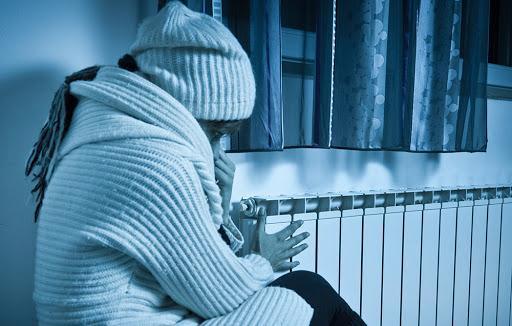
If you have you have Hot Water But No Central Heating in your home, it can be a real headache for everyone involved and with modern complex heating systems, it can also be quite confusing when figuring out what to do.
In this article, we will go over some issues and steps to take if you are having problems with your radiators or central heating.
You can now get a quote for a boiler online in less than 20 seconds to see how much a new boiler costs just in case!
Or if you want your boiler checked over why not book a boiler service here:
Get your Fixed Price Boiler Quotes Online
New Gas Boilers with £0 Deposit & 0% Interest Finance Availble
Get the best quotes for boiler installation online in under 1 minute now
Boiler not heating radiators or hot water
- Sometimes when your boiler is working but your radiators are not heating, the most likely culprit is a malfunctioning boiler pump or central heating controls.
- If your boiler is running but your radiators are chilly, make sure the thermostat or timer is set appropriately. If they need to be replaced, you’ll need to employ a registered heating engineer to do the job.
The timer and maybe the thermostat is broken
Check that the thermostat or timer is working properly. If you discover a problem, speak with your heating engineer to get a replacement fitted.
The system contains air pockets.
If your radiators remain freezing, you may have air in your system. When this occurs, your radiators will alternatively get cold as air pockets migrate around the heating system. Before calling in a professional, read our article on how to bleed a radiator.
Faulty Pump
If you’ve done everything else and our guide to diagnosing central heating problems hasn’t helped, it’s possible that your circulation pump is broken. If this is the case, you’ll need to contact a licenced heating technician to fix or replace it.
System problems and dirt
Your heating system may also be clogged with dirt or sludge, which can obstruct circulation and cause radiators to overheat. If you’re not sure in your ability to handle the problem, it could be time to call in a Gas Safe Registered Engineer.
Why are my radiators not getting hot but the hot water is working?
You’ll be relieved to know that there are some non-professional solutions to this problem.
Check your room thermostat
When you have hot water but no heat, the first thing to check is that the thermostat is working properly.
Room thermostats allow you to control the temperature of a room as well as when the heating should be turned on. Has the heating not turned on when it was supposed to? Check that the settings are correct and, if necessary, adjust the timings.
Low boiler pressure
Check the boiler pressure if you can’t find a problem with the thermostat as It could be that your boiler pressure is too low.
The pressure of hot water running through the heating system is referred to as boiler pressure. If the boiler pressure falls below a certain level, the central heating won’t work.
You can, once again, adjust the boiler pressure yourself. Because each boiler is slightly different, we will not provide instructions here. The best thing to do is consult your owner’s manual. There is usually a key or a valve that allows you to add more water to increase the pressure.
If you are unsure how to proceed, consult a professional. All of our local heating engineers are Gas Safe registered and eager to help you get your heating back up and running.
What if the problem isn’t with the thermostat or the boiler pressure?
To diagnose the problem, you will most likely need to call in a heating engineer. If you have hot water but no central heating, there could be other problems if it isn’t the thermostat or the boiler pressure. Check out our guide on the most common boiler problems to learn more.
Broken diaphragms and airlocks are common causes of this fault, as is a motorised valve failing. These problems will need the arrival of a professional heating engineer to repair or replace the faulty component.
Hot Water But No Central Heating? – Causes & Fixes
That is, your hot water is working properly, but your radiators are not turning on or are producing insufficient heat.
We’ll try to give you some simple steps you can take to try to fix or diagnose the problems if you don’t need a new boiler right away.
So, without further ado, let’s go over some of the best radiator heating tips and fixes…
Radiators may be blocked or need bleeding
If you’re having central heating problems, make sure none of your radiators is broken or you need to bleed your radiators. There is no problem with your boiler if only one radiator feels slightly warm
If one of your radiators is mildly warm, try bleeding it by turning the bleed valve on the side of the radiator anticlockwise with a radiator bleed key. To keep dirty water from dripping on your floor, place some pans and towels beneath the radiator and the bleed valve.
Radiators that are cold on the sides and bottom but warm on top are most likely full of sludge. Read our radiator cleaning guide to resolve this issue.
Cold or Slightly Warm Radiators:
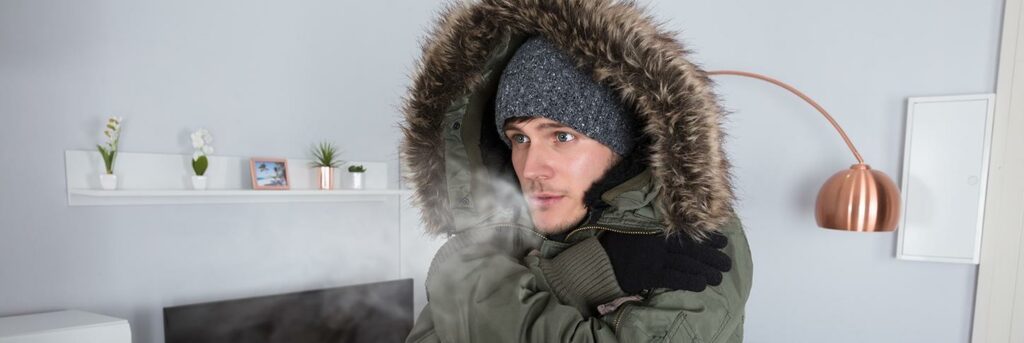
If your water heater is not as warm as you would like, it may need to be vented. When there is more air in the cold water supply than hot water in the system, the air rises and exits the system when it is cold, usually finding a home in the radiators.
Air pockets in the radiator: Air can often become trapped in the central heating system and obstruct the flow of water, leaving the radiator cold. There are several ways to fix this, but the most basic is to bleed the radiator. Depending on the type of system, you can also inspect vents, air filters, or air ducts.
You can also manipulate the main valve to release air while preventing water from escaping, as with an air filter, air compressor, or even a new radiator if it was recently installed.
Furthermore, you may notice that not all radiators get hot and that some take longer to heat up than they used to. If you raise the thermostat temperature to warm them up and then discover cold spots, you have a problem.
If this is the case, we believe that particulate dirt and air can accumulate in the radiators throughout the home and cause uneven heat distribution; this is more than likely the failure point with many radiator faults.
This dirt and excess air pockets can accumulate in your central heating system over time, and blockages can reduce the quality of your heating or even stop it entirely.
A power flush could sort this problem
Uneven Radiator Heating:
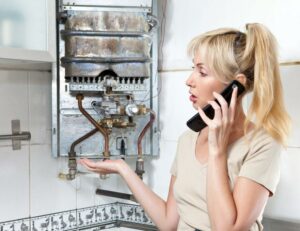
Because the bottom of your radiator does not circulate hot water from the radiator system, you may need to ventilate it if it becomes hot. This could be due to the water pump shaft not being turned on or to a problem with the pump itself.
To resolve this issue, first fill the system with water and then, bleed it with hot water from the cooling water pump shaft or a cold water tank.
This will help to keep the water pump shaft from turning and, as a result, hot water from the radiator from circulating. The boiler does not provide enough hot water to heat the house if it is not properly pressurised. Now that you understand the problem with the circulating hot water heater, you should be able to solve it on your own.
Heat Exchangers Problems:
The heat exchanger is another likely source of trouble in many systems.
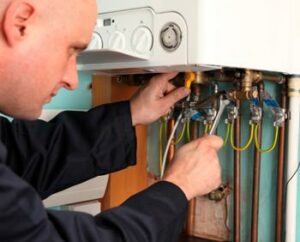
Let me explain further… Fine heat rays (60 ° C to 140 ° F) penetrate a heat exchanger connected to a cold water pipe, heating the water.
The heated water is then pumped to the radiator, which is usually hidden in the system pipe in a new house.
When there is no central heating, hot water flows through the pipes continuously. If your radiator is cold, first ensure that you have turned off both the boiler and the central heating in the system, and then check the radiators in your home to see if any of them are working if you have a problem with the central heating.
If only one radiator is warm, there is nothing wrong with the boiler; however, if the heat is only mild, try turning off the vent valve. If one of the radiators is getting too hot, try venting it and placing a towel over the vent valve to keep dirty water from dripping onto the floor.
If your heat exchanger is faulty, compare new gas boiler prices as it may be more cost-effective in the long run.
Radiator Noises:
If a traditional boiler makes noise, it indicates that the bottom of the heating system is warm but the rest is not. For example, if the heat exchanger on one radiator fails but not on all of them, the radiator can vent, causing the problem to be resolved by heating all radiators to a high temperature.
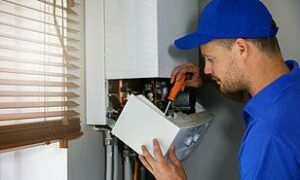
Because the new boiler condenses, a small amount of exhaust gas is turned off before it enters the condensate pipes.
When the heat is turned on in the house, a pump begins to draw water from the boiler and pump it to the radiator. When the house reaches the desired temperature, the pump turns off until the heating is turned off. If your pump fails, you may hear whirring or grinding noises, which can indicate a problem that requires further investigation by a heating engineer.
Pump failures are bad, so compare boiler quotes and look at the best combi boiler available.
Central Heating Thermostat Controls
Are you certain that your central heating is turned on? Check that the thermostat on your boiler (or elsewhere in the house) is properly set and that the timers are properly set. If the power goes out, your boiler may reset and you will need to re-adjust the settings. If the clocks have recently shifted forward or back, your timer may have been set incorrectly and will need to be reset.
Problems with the boiler pressure
Is your boiler’s pressure one bar? If your water pressure is too low, your central heating may not function properly. If the pressure falls below one bar, repressurize your boiler – you may need to consult your user manual for instructions.
Try resetting your boiler; there may be a reset button or switch on the outside of the appliance, most likely on the front. To access this button, do not remove the boiler cover or any casing. Alternatively, turn off the power to your boiler, wait 30 seconds, and then turn it back on.
Do you have a combi boiler?
If you have a combi boiler, the issue could be a faulty diverter valve. Combi boilers provide hot water and heating to your home on demand. The diverter valve directs hot water to the appropriate location, which could be the hot water outlets like your taps or the radiators.
If the valve becomes stuck, you will either have central heating and no hot water, or the opposite.
Again, a qualified gas Safe heating engineer will be required to identify the fault and make a repair or replacement to get your central heating working again.
All of our expert engineers at Green Central are Gas Safe registered. Please contact us if you are experiencing any problems with your boiler or central heating. You can use our handy postcode checker to see if we cover your area.
If you have one of our Care Plans, a callout is included in your monthly fee. If you are not yet a Care Plan customer, you can learn more about it here. Prices begin at £7.50 per month, which includes parts, labour, and your annual boiler service.
It is probably best to also see what boiler service costs before you book it to see what can affect the price and how much you may end up spending.
Broken Diverter Valves
If you’ve tried all of the above fixes and your central heating still doesn’t work, you might have a broken diverter valve. These valves control the flow of heat from your water supply to your central heating system. After prolonged use, these valves can develop a variety of faults that prevent them from changing position, causing either your central heating or hot water to fail.
Boilers should only be repaired by trained professionals. Call out fees, parts, and labour can all add up to make a boiler repair an expensive experience!
Other information about why you have Hot Water But No Central Heating?
When the temperature drops, heaters that have been unused for a while or that have sat for an extended period may no longer function. If the weather in your area is cold and the boiler is still on, try turning off the water heater. After leaving the heater off for about 30 minutes, turn on the kitchen and bathroom faucets to ensure that the water is warming up.
If everything begins to heat up, you may want to increase the heating when the temperature rises. Shut off your central heating and check to see if it’s still hot; if so, turn it off.
When the temperature drops, heaters that have been sitting for a while or that have been unused for a while may no longer function. Turn off the water heater if the weather in your area is cold and the boiler is still on. Turn on the kitchen and bathroom faucets after leaving the heater off for about 30 minutes to ensure that the water is warming up.
If everything starts to heat up, you may want to turn up the heat as the temperature rises. Check to see if your central heating is still on and if so, turn it off.
If you require a boiler cover, we can also assist you. Our plans begin at £13.99, and we have plans that can help you rest assured that most, mainly all, issues are covered. You can get a new boiler on finance if you want to spread the cost over time.
Still, Having Issues With Cold Radiators and Central Heating?
Are you are unsure? If you are, do not touch any part of your boiler or central heating system.
Did you know that? It is unlawful for anyone to use a gas appliance if they believe it is unsafe. It’s always better to be safe than sorry, as you could end up making matters worse.
Instead, schedule an appointment with one of our friendly and knowledgeable Gas Safe registered engineers to get you back up and running as soon as possible.
Get your Fixed Price Boiler Quotes Online
New Gas Boilers with £0 Deposit & 0% Interest Finance Availble
Get the best quotes for boiler installation online in under 1 minute now
Written by
Get your Fixed Price Boiler Quotes Online
New Gas Boilers with £0 Deposit & 0% Interest Finance Availble
Get the best quotes for boiler installation online in under 1 minute now





